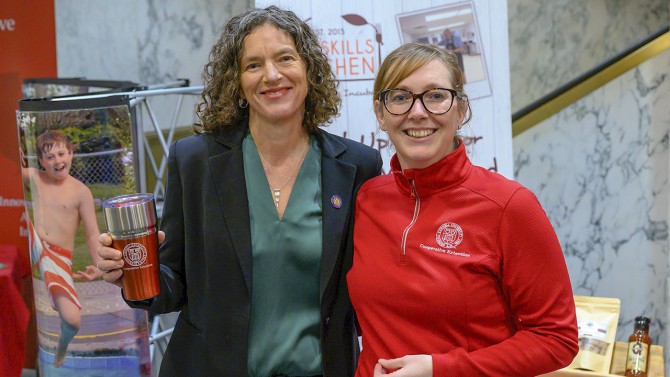Rooted in every county of the state, Cornell Cooperative Extension translates Cornell University’s world-class research into practical, real-world knowledge that helps New York state residents, businesses and communities thrive.
Extension shares community connections in Albany
By R.J. Anderson
While no red carpet was rolled out across its marble floors, the New York State Capitol in Albany was awash in Cornell red Jan. 27 as state Senate and Assembly members welcomed more than 50 Cornell Cooperative Extension (CCE) county association executive directors from across New York.
In the Capitol lobby, which was lined with CCE banners and tables, lawmakers engaged with interactive displays highlighting CCE-led initiatives such as 4-H Camps, farm-to-school programs, robotics, food systems, and Relatives and Parents programs.
During meetings with their local representatives, CCE’s executive directors shared examples of how CCE programming – which is informed by Cornell research – positively impacts communities in their respective districts. All told, extension programming reaches nearly 1.7 million New York state residents annually.
The executive directors also shared a simple message: With additional funding, they can do more to support New Yorkers with the greatest needs. At the county level, that would mean an increase in the state funding CCE associations receive through NYS County Law 224, which funds the university’s land-grant public engagement mission.
For the past 25 years, the funding – which is shared among each of New York’s 57 counties outside of New York City – has remained level, at $3.9 million.
For 2020, CCE is asking lawmakers to more than double that contribution to $8 million, including $200,000 for Cornell University Cooperative Extension New York City, which currently receives no state funding despite serving all five boroughs.
“With additional funding from the state, CCE will be able better capitalize on its reach in every community,” said CCE Director Chris Watkins. “Priorities for extension are specific to each county, but limited resources can restrict our flexibility to meet current needs and emerging issues.”
With its strong connection to applied research from Cornell and a long history of working with community partners, CCE is looking forward to stepping up its contributions to community resilience and providing even more support for New York’s families.
“Increasing County Law 224 dollars would allow our associations to provide an even higher level of service in responding to issues like the opioid crisis, facilitate boots-on-the-ground support when disasters strike, and pursue more research-based environmental justice projects related to urban and community agriculture,” Watkins said. “We’ll also be better equipped to help our farmers and food producers develop and access tools and resources to better compete in what is an increasingly challenging marketplace.”
CCE’s message about the need for increased financial support was received loud and clear by legislators, Watkins said.
“Based on our conversations, they fully understand the need to increase the resources in counties across New York,” said Watkins, citing Assemblywoman Donna Lupardo, D-123rd and chair of the Assembly Agriculture Committee, and state Sen. Jen Metzger, D-42nd, chair of the Senate Agriculture Committee, as ardent supporters of CCE.
“We are incredibly excited about the support for CCE’s mission that we are receiving from leaders like Assemblywoman Lupardo and Senator Metzger,” Watkins added. “Their efforts to galvanize support for CCE are greatly appreciated as they know that this great system is worthy of investment for the citizens of New York.”
“It was wonderful to see Cooperative Extension out in force at the Capitol this week,” said Lupardo, who has worked closely with CCE of Broome County on a number of initiatives. “It makes it easier to advocate for additional funding when other legislators learn more about how vital CCE is across the state. As we continue to highlight the importance of New York agriculture, CCE plays an invaluable role in this work.”
Said Metzger: “Cornell Cooperative Extension plays a unique and critically important role in communities across the state, providing needed technical assistance, training, and educational and outreach programs in a wide range of areas, whether it's providing technical expertise to farmers, hosting 4-H clubs, helping residents and businesses reduce energy costs, protecting ecosystems, or improving child nutrition. CCE is an invaluable partner to schools, community-based organizations and local governments, and the agricultural community, and I am proud to advocate for state funding to support and sustain the organization's important work.”
R.J. Anderson is a writer and communications team leader with Cornell Cooperative Extension.
Media Contact
Get Cornell news delivered right to your inbox.
Subscribe


